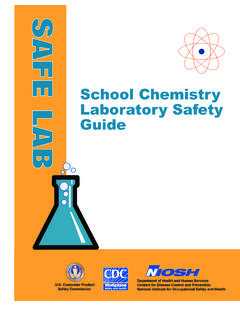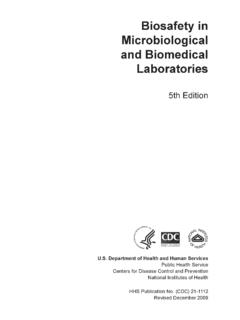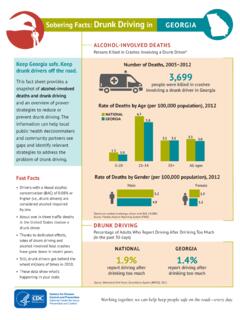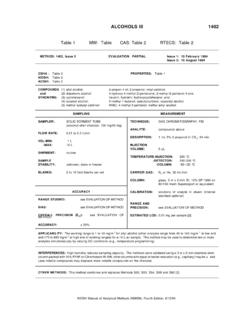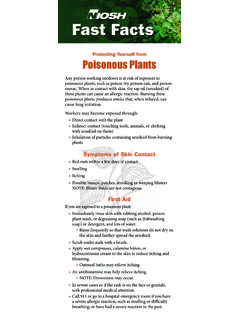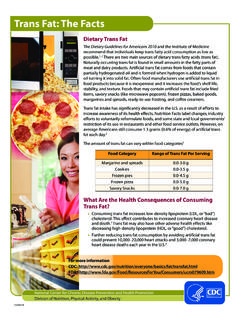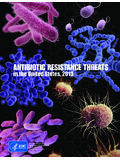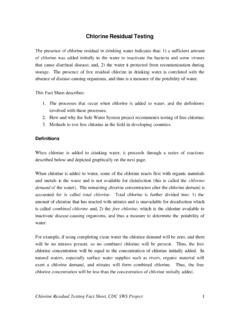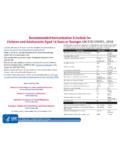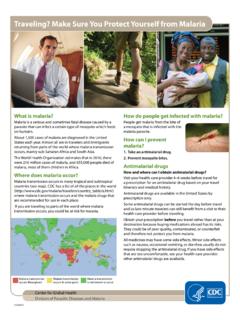Transcription of Sexually Transmitted Infections Treatment Guidelines, 2021
1 Morbidity and Mortality Weekly ReportRecommendations and Reports / Vol. 70 / No. 4 July 23, 2021 Sexually Transmitted Infections Treatment Guidelines, Department of Health and Human ServicesCenters for Disease Control and PreventionThe MMWR series of publications is published by the Center for Surveillance, Epidemiology, and Laboratory Services, Centers for Disease Control and Prevention (CDC), Department of Health and Human Services, Atlanta, GA citation: [Author names; first three, then et al., if more than six.] [Title]. MMWR Recomm Rep 2021;70(No. RR-#):[inclusive page numbers].Centers for Disease Control and PreventionRochelle P. Walensky, MD, MPH, DirectorDebra Houry, MD, MPH, Acting Principal Deputy DirectorDaniel B. Jernigan, MD, MPH, Acting Deputy Director for Public Health Science and SurveillanceRebecca Bunnell, PhD, MEd, Director, Office of ScienceJennifer Layden, MD, PhD, Deputy Director, Office of ScienceMichael F.
2 Iademarco, MD, MPH, Director, Center for Surveillance, Epidemiology, and Laboratory Services MMWR Editorial and Production Staff (Serials)Charlotte K. Kent, PhD, MPH, Editor in Chief Christine G. Casey, MD, EditorMary Dott, MD, MPH, Online EditorTerisa F. Rutledge, Managing EditorDavid C. Johnson, Lead Technical Writer-EditorMarella Meadows, Project EditorMartha F. Boyd, Lead Visual Information SpecialistAlexander J. Gottardy, Maureen A. Leahy,Julia C. Martinroe, Stephen R. Spriggs, Tong Yang,Visual Information SpecialistsQuang M. Doan, MBA, Phyllis H. King, Terraye M. Starr, Moua Yang,Information Technology Specialists MMWR Editorial BoardTimothy F. Jones, MD, ChairmanMatthew L. Boulton, MD, MPHC arolyn Brooks, ScD, MA Jay C. Butler, MD Virginia A.
3 Caine, MD Jonathan E. Fielding, MD, MPH, MBAD avid W. Fleming, MD William E. Halperin, MD, DrPH, MPHJ ewel Mullen, MD, MPH, MPAJeff Niederdeppe, PhDCeleste Philip, MD, MPHP atricia Quinlisk, MD, MPH Patrick L. Remington, MD, MPH Carlos Roig, MS, MAWilliam Schaffner, MD Nathaniel Smith, MD, MPHM organ Bobb Swanson, BSAbbigail Tumpey, MPHIan Branam, MA, Acting Lead Health Communication SpecialistShelton Bartley, MPH,Lowery Johnson, Amanda Ray, Jacqueline N. Sanchez, MS,Health Communication SpecialistsWill Yang, MA,Visual Information SpecialistRecommendations and ReportsCONTENTSI ntroduction ..1 Methods ..1 Clinical Prevention Guidance ..2 STI Detection Among Special Populations ..11 HIV Infection ..24 Diseases Characterized by Genital, Anal, or Perianal Ulcers.
4 27 Syphilis ..39 Management of Persons Who Have a History of Penicillin Allergy ..56 Diseases Characterized by Urethritis and Cervicitis ..60 Chlamydial Infections ..65 Gonococcal Infections ..71 Mycoplasma genitalium ..80 Diseases Characterized by Vulvovaginal Itching, Burning, Irritation, Odor, or Discharge ..82 Pelvic Inflammatory Disease ..94 Epididymitis ..98 Human Papillomavirus Infections ..100 Viral Hepatitis ..113 Proctitis, Proctocolitis, and Enteritis ..124 Ectoparasitic Infections ..126 Sexual Assault and Abuse and STIs ..128 References ..135 Recommendations and ReportsMMWR / July 23, 2021 / Vol. 70 / No. 4 1US Department of Health and Human Services/Centers for Disease Control and PreventionSexually Transmitted Infections Treatment Guidelines, 2021 Kimberly A.
5 Workowski, MD1,2; Laura H. Bachmann, MD1; Philip A. Chan, MD1,3; Christine M. Johnston, MD1,4; Christina A. Muzny, MD1,5; Ina Park, MD1,6; Hilary Reno, MD1,7; Jonathan M. Zenilman, MD1,8; Gail A. Bolan, MD11 Division of STD Prevention, National Center for HIV/AIDS, Viral Hepatitis, STD, and TB Prevention, CDC, Atlanta, Georgia; 2 Emory University, Atlanta, Georgia; 3 Brown University, Providence, Rhode Island; 4 University of Washington, Seattle, Washington; 5 University of Alabama at Birmingham, Birmingham, Alabama; 6 University of California San Francisco, San Francisco, California; 7 Washington University, St. Louis, Missouri; 8 Johns Hopkins University, Baltimore, MarylandSummaryThese guidelines for the Treatment of persons who have or are at risk for Sexually Transmitted Infections (STIs) were updated by CDC after consultation with professionals knowledgeable in the field of STIs who met in Atlanta, Georgia, June 11 14, 2019.
6 The information in this report updates the 2015 guidelines. These guidelines discuss 1) updated recommendations for Treatment of Neisseria gonorrhoeae, Chlamydia trachomatis, and Trichomonas vaginalis; 2) addition of metronidazole to the recommended Treatment regimen for pelvic inflammatory disease; 3) alternative Treatment options for bacterial vaginosis; 4) management of Mycoplasma genitalium; 5) human papillomavirus vaccine recommendations and counseling messages; 6) expanded risk factors for syphilis testing among pregnant women; 7) one-time testing for hepatitis C infection; 8) evaluation of men who have sex with men after sexual assault; and 9) two-step testing for serologic diagnosis of genital herpes simplex virus. Physicians and other health care providers can use these guidelines to assist in prevention and Treatment of preparer: Kimberly A.
7 Workowski, MD, Division of STD Prevention, National Center for HIV/AIDS, Viral Hepatitis, STD, and TB Prevention, CDC. Telephone: 404-639-1898; Email: term Sexually Transmitted infection (STI) refers to a pathogen that causes infection through sexual contact, whereas the term Sexually Transmitted disease (STD) refers to a recognizable disease state that has developed from an infection. Physicians and other health care providers have a crucial role in preventing and treating STIs. These guidelines are intended to assist with that effort. Although the guidelines emphasize Treatment , prevention strategies and diagnostic recommendations also are report updates Sexually Transmitted Diseases Treatment Guidelines, 2015 (1) and should be regarded as a source of clinical guidance rather than prescriptive standards.
8 Health care providers should always consider the clinical circumstances of each person in the context of local disease prevalence. These guidelines are applicable to any patient care setting that serves persons at risk for STIs, including family planning clinics, HIV care clinics, correctional health care settings, private physicians offices, Federally Qualified Health Centers, clinics for adolescent care, and other primary care facilities. These guidelines are focused on Treatment and counseling and do not address other community services and interventions that are essential to STI and HIV prevention STI Treatment guidelines complement Recommendations for Providing Quality Sexually Transmitted Diseases Clinical Services, 2020 (2) regarding quality clinical services for STIs in primary care and STD specialty care settings.
9 This guidance specifies operational determinants of quality services in various clinical settings, describes on-site Treatment and partner services, and indicates when STI-related conditions should be managed through consultation with or referral to a guidelines were developed by CDC staff who worked with subject matter experts with expertise in STI clinical management from other federal agencies, nongovernmental academic and research institutions, and professional medical organizations. CDC staff identified governmental and nongovernmental subject matter experts on the basis of their expertise and assisted them in developing questions to guide individual literature reviews. CDC staff informed the subject matter experts that they were being consulted to exchange information and observations and to obtain their individual input.
10 All subject matter experts disclosed potential conflicts of interest . STI Treatment Guidelines, 2021, Work Group members are listed at the end of this 2018, CDC staff identified key questions about Treatment and clinical management to guide an update of the 2015 STD Treatment guidelines (1). To answer these questions and synthesize new information available since publication of the 2015 guidelines, subject matter experts and CDC staff Recommendations and Reports2 MMWR / July 23, 2021 / Vol. 70 / No. 4US Department of Health and Human Services/Centers for Disease Control and Preventioncollaborated to conduct systematic literature reviews by using an extensive MEDLINE database evidence-based approach for each section of the 2015 guidelines ( , using English-language published abstracts and peer reviewed journal articles).
